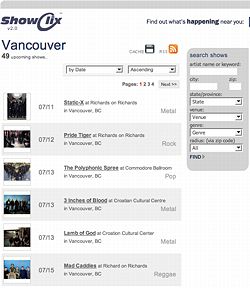I was contacted the other day about ShowClix. Basically, it’s a one stop shop for finding shows in your area, or at least that is the intention. I’ve often thought about the concept and how hard it would be to possibly list every show that you possibly could in a city, especially in Vancouver. The truth is that you can’t, but after registering on their site, there are a few shows that caught my attention that I hadn’t known about. Obviously, this means the site is doing the job it’s intending to do.
 I still feel like the interface is a bit wet behind the ears, but you are able to search with a little ease. However, they don’t stop at listing shows. If you are putting on a show, you can sell tickets through their site. I don’t know the details involved, but apparently it’s free. Purchasers are basically put on a guest list that they have bought spots on. That’s a neat concept, and that puts you in control of the door to confirm people’s identity as they enter the venue. It’s your own, little Ticketmaster.
I still feel like the interface is a bit wet behind the ears, but you are able to search with a little ease. However, they don’t stop at listing shows. If you are putting on a show, you can sell tickets through their site. I don’t know the details involved, but apparently it’s free. Purchasers are basically put on a guest list that they have bought spots on. That’s a neat concept, and that puts you in control of the door to confirm people’s identity as they enter the venue. It’s your own, little Ticketmaster.
Everyone is free to add shows as well, and this will be helpful in creating an all encompassing list of shows to see, no matter how big or small. Once again, a daunting task, but if you can bust down the social barriers that bring the mainstream and the underground together, then I’m all for it. At least, if I am understanding this right, you can list a show for your garage band in your uncle’s basement right next to the dudes playing a stadium show on the same night. And dude, I’d totally love to hang out with you on your uncle’s basement rather than get back row seats at GM Place.
It’s a unique take on mashing up Web 2.0 with live music, concert venues, and social networking. There are even ways to list the shows you plan on checking out on your blog, opening up a way to see what your fellow blogger friends who are also registered on the site will be checking out. Then you can chastise them for their musical tastes even more.
True that the listings in Vancouver are a little weak, but they have launched in Canada as of a week or so ago. Checking around other cities, there is quite a bit. Even better, they offer RSS feeds so you can subscribe and keep up to date on new concert listings as they are added for you particular city.
Check out ShowClix for yourself if you are the concert going type. I know that I never get to see enough.




